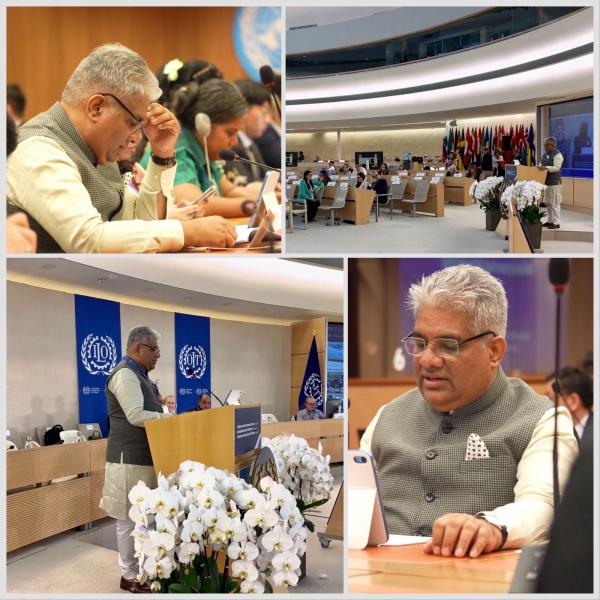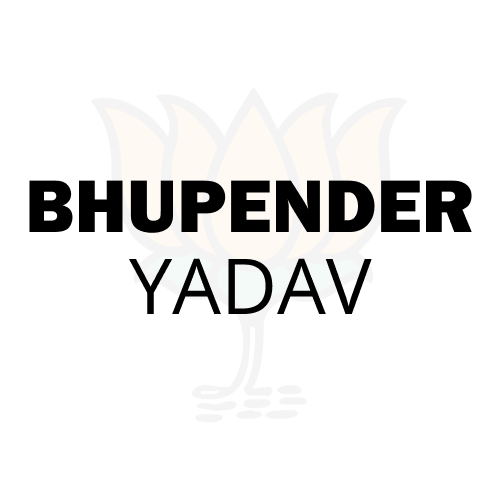
International Labour Conference Diary: India working for social security, decent work
13/06/2023
BLOG
International Labour Conference Diary: India working for social security, decent work
At the 111th International Labour Conference (ILC) of International Labour Organisation (ILO) being held in Geneva, I addressed the Plenary Session.
I began by congratulating ILO for organising and returning to the fully in-person ILC meeting. Further, I highlighted that India, under the leadership of Hon’ble Prime Minister Shri Narendra Modi ji, is moving towards its Amrit Kaal with the aim to provide social security and decent work to itsworkforce both in the organised and the unorganised sectors.
With about 65% of its population under the age of 35 years, India anticipates an influx of youth population in its labourforce. At the same time, the mega-trends of Industry 4.0, climate change and technological advances (such as Web 3.0, Big Data and Artificial Intelligence) are impacting the lives and livelihoods. I stated that in this scenario, the agendas for discussion on apprenticeship, labour protection and just transition in the 111th ILC meeting are more relevant than ever for India as well as in the global context.
The 111th International Labour Conference is happening at a time when India has assumed the G20 Presidency for a one-year period from December 2022 to November 2023. During the India’s Presidency, the G20 Employment Working Group (EWG) is discussing three important priority areas which are:
I stated that through these discussions, India aims to develop tools to map skill gaps among countries and move towards harmonisation and mutual recognition of skills and qualifications across G20 countries and to find out ways for sustainable financing mechanisms for providing universal and comprehensive social security coverage for all, including for gig and platform workers.
At the Plenary, I stated that India is working committedly to advance social justice for all through its efforts to provide universal and comprehensive social protection to all formal and informal sector workers. For formal sector workers, Employees Provident Fund Organisation (EPFO) and Employees’ State Insurance Corporation (ESIC) are two national organisations extending social security benefits.
EPFO provides social security benefits in the form of Provident, Pension and Insurance Funds to the organised workforce. These benefits under EPFO extend to over 393,824 establishments and 118 million members in the country.
India is also committed to strengthen labour protection, including for informal sector workers. ESIC is a pioneer social security organisation providing social security benefits to formal workers in the exigencies of death, disablement, sickness, maternity, medical needs, unemployment and old age. It is serving 31 million Insured Persons with their family members which takes the number of total beneficiaries to 120.3 million persons. Currently, ESIC has 161 hospitals, 1,502 dispensaries and 8 medical colleges across the country.
I informed the Member States of ILO at the session about how India is creating a National Database of Informal/Unorganised sector workers in the country, seeded with unique identification numbers, through a digital portal named ‘e-SHRAM’. I proudly shared that about 290 million informal sector workers have been registered on the portal so far and explained how this database will help in evidence-based policy making and targeted delivery of social security schemes to informal workers.
To provide formal channels of employment to informal workers, the e-Shram portal has been linked with the national employment services portal viz. the National Career Service (NCS) portal. The NCS portal has also been linked with ‘Skill India portal’ to provide the supply of skilled qualified candidates, and with micro and small enterprise portal which depicts whole of the government approach to provide job opportunities to all workers.
I underlined that India under Hon’ble Prime Minister Shri Modi ji is leading the world in digital payments and improving citizens’ lives and governance systems through use of technology. Direct Benefit Transfer (DBT) system ensures better and timely delivery of benefits to targeted beneficiaries using Information and Communication Technology (ICT) under various welfare schemes in a transparent manner.
India is making efforts for mapping of both in-cash and in-kind social security benefits provided to Indian citizens, seeded with unique identification numbers, under various Central sector and State Governments’ schemes. The Modi government’s efforts to provide social protection haveresulted in providing over 30 million pucca houses to the poor, piped water connection to more than 110 million households and health insurance to nearly 500 million beneficiaries under Ayushman Bharat Yojna.
For the welfare of international migrant workers, India actively promotes signing of Social Security (Totalisation) Agreements among countries. These agreements aim to treats the workers of the host country and the home country equally especially in terms of social security.
I also requested ILO to promote signing of bilateral/plurilateral social security agreements.
In the days ahead, I aim to speak to representatives of Member States on key areas to deepen cooperation in the interest of workers in India and also workers in ILO Member Countries.
